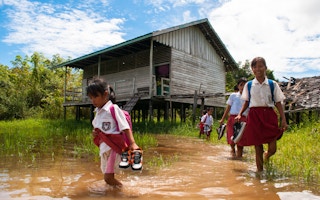In the vein of “We Are the World,” the 1985 hit that sold more than 20 million copies globally, the song “Lasting Legacy” was released at the United Nations Climate Change Conference (COP28) in Dubai. The official charity anthem features 13 artists from around the world singing about unity, cooperation, and climate action.
One legacy of COP28 that ought to be commemorated in song is the launch of the Loss and Damage Fund. This new channel for multilateral finance aims to support developing countries that are facing ballooning costs from storms, heatwaves, floods, landslides, wildfires, droughts, sea-level rise, biodiversity loss, and desertification. These adverse effects of global warming are causing hundreds of billions of dollars in damage every year.
Currently, however, pledges to the Loss and Damage Fund are well below target. At COP28, donor countries, led by France, Germany, Italy, the United Arab Emirates, and the United Kingdom, promised around US$700 million – far short of what is needed to meet the challenge.
Despite that, the UAE’s commitment is a welcome departure from the widely held view that only those countries with a historic responsibility for climate change should pay for loss and damage. It signals to today’s world that the responsibility for the state of the planet and its climate must be borne by everyone, while underscoring the importance of multilateral cooperation, especially among powerful governments.
To be sure, billions of dollars are already being invested in climate-change mitigation and adaptation through the multilateral system. Nearly all international financing institutions have facilities devoted to this end. The International Monetary Fund, for example, has its Resilience and Sustainability Trust, which received at least US$41.1 billion in pledges as of November 2023.
Meanwhile, the UN has several, including the Central Emergency Response Fund, which spent around US$2.2 billion between 2006 and 2022 on efforts to mitigate the effects of climate change, and Country-Based Pooled Funds. The UN Framework Convention on Climate Change Synthesis Report on Loss and Damage (which one of us co-authored) identified some 45 funding windows dedicated to disaster preparedness, with 13 more focused on emergency response.
“
The Summit for a New Global Financing Pact, convened by French President Emmanuel Macron last year, and the Bridgetown Initiative led by Barbadian Prime Minister Mia Amor Mottley provide many starting points and proposals for redesigning the global financial system.
This raises the question of where the Loss and Damage Fund fits in this crowded and complex terrain. Certainly, there is still a great need for financing: significant gaps remain, and the lack of grant funding, especially for recovery and reconstruction, is particularly worrisome.
It will also be crucial to expand climate-risk insurance coverage and facilitate debt swaps (and deferrals) to create more fiscal space amid surging global interest rates. On the other hand, the new fund risks becoming another vain attempt to mend a multilateral system that is outdated and unfit for purpose – especially if it is underfunded.
To avoid that outcome, the Loss and Damage Fund should move away from a project-based model that involves doling out small amounts of money. Given the scale of the challenge and the intensity of people’s suffering, the Fund should instead embrace structural and policy innovations that would help establish a new generation of multilateral organisations.
The Summit for a New Global Financing Pact, convened by French President Emmanuel Macron last year, and the Bridgetown Initiative led by Barbadian Prime Minister Mia Amor Mottley provide many starting points and proposals for redesigning the global financial system.
More specifically, the Loss and Damage Fund could create a new template for countries to mobilise domestic resources for climate mitigation and adaption more effectively, and to access global financial markets and multilateral lending at fair terms, as well as different forms of debt relief. The Fund could also design a global insurance scheme for the most vulnerable households and small and medium-size businesses.
In today’s fragmented world, the Loss and Damage Fund could easily be derailed. But it is in our common interest to assist the most climate-vulnerable countries with recovery and reconstruction in a way that does not compromise development gains achieved over past decades. Providing these countries with enough resources, financial and otherwise, would ensure stability for us all.
Monique Barbut, former CEO of the Global Environment Facility, is Special Envoy for the Global Climate and Environment Agenda of the French President. Robert R. Filipp, President of the Innovative Finance Foundation, is co-author of the United Nations Framework Convention on Climate Change (UNFCCC) Synthesis Report on Loss and Damage.
© Project Syndicate 1995–2024



















